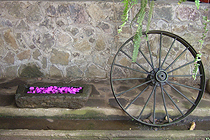Gratitude is an emotion which involves a feeling of emotional indebtedness towards another person; often accompanied by a desire to thank them, or to reciprocate in kind. (abbreviated from the wiki-people)
From a Buddhist point of view, the Pali word which we translate in English as gratitude is katannuta. The word katannuta consists of two parts: kata which means that which has been done, especially that which has been done to one, to oneself, and annuta which means knowing or recognising.
So katannuta means knowing or recognizing what has been done, that is to say knowing and recognising what has been done to one for one's benefit. Hence the connotation of the Pali word is rather different from its English equivalent. The connotation of the English gratitude is more emotional but the connotation of katannuta is rather more intellectual.
This suggests that gratitude involves an element of knowledge - knowledge of what has been done to us or for us. If we do not know that something has benefited us, we'll not feel gratitude. (More wiki-people)
So, then, is it the recognizing that allows us to be/feel gratitude? Or does the taking for granted the things we forget to notice allow us to miss the intellectual boat and therefore, forget to be grateful?
Because truly, it would seem, if we were cognizant of our good fortune, and anyone who has the luxury of blog reading falls into that category in varying degrees, then we'd exist in a perpetual state of gratitude - perhaps not to each other, but to divinity or mother earth.
I am rolling around the notions of intellectual versus emotional gratitude, and more importantly, how mindfulness of the above can not only affect my daily existence, but allow me to embrace a fuller potential. Because if you break it down, none of us are givers. Rather, we are all part of a giant cosmos that gives and takes, and sometimes our energies intersect with others, and good things happen. To consider oneself a giver supposes a connotation that we are indeed separate.
And honestly, sometimes there is a hell of a lot of ego in that. J mentioned the other day that my blog friends must have a one sided image of me - that I carry on about homeless this, and giving that, and it's all inherently bullshit because giving is not about me. I got rather pissed for a few minutes, and then realized he was right. It's true, I might hold my ideals in front of me as a way to fulfill ego. I also might want to share the things I care about. But I got too defensive not to admit there was truth in his words. And it made me wonder if I wasn't somehow needing to make it known, rather than done for the sake of doing. (Perhaps I am more of a Buddhist than I thought). Probably not. But I digress.
I am paraphrasing a piece from Kahlil Gibran as further food for thought:
You give but little when you give of your possessions.
It is when you give of yourself that you truly give.
For what are your possessions but things you keep and guard for fear you may need them tomorrow?
And what is fear of need but need itself?
There are those who give little of the much which they have - and they give it for recognition and their hidden desire makes their gifts unwholesome. And there are those who have little and give it all.
These are the believers in life and the bounty of life, and their coffer is never empty.
There are those who give with joy, and that joy is their reward.
And there are those who give with pain, and that pain is their baptism.
And there are those who give and know not pain in giving, nor do they seek joy, nor give with mindfulness of virtue;
Though the hands of such as these God speaks, and from behind their eyes He smiles upon the earth.
For in truth it is life that gives unto life - while you, who deem yourself a giver, are but a witness. And you receivers - and you are all receivers - assume no weight of gratitude, lest you lay a yoke upon yourself and upon him who gives. Rather rise together with the giver on his gifts as on wings; For to be overmindful of your debt, is to doubt his generosity who has the free-hearted earth for mother, and God for father.
I like this - a combination disavowing guilt trips AND pushing for interconnectedness and lack of ego. There's a reason he's called The Prophet, yo.
So I'll continue to mull. I think this goes back to the simple act of being mindful. And how we get to continually decide how we want to show up in this world. And how we might not want to show up after all.
skip to main |
skip to sidebar


Man, I see in Fight Club the strongest and smartest men who've ever lived. I see all this potential, and I see it squandered. God damn it, an entire generation pumping gas, waiting tables; slaves with white collars. Working jobs we hate so we can buy shit we don't need. Our Great Depression is our lives. We've been raised on television to believe that one day we'd all be millionaires. But we won't. And we're slowly learning that fact. And we're very, very pissed off.
twhat?
Did you know that you can earn a
masters degree in social work and never have to leave home?
gimme shelter (advertise on one plus two)
Wrinkle Cream such as Dermapril reviewed and evaluated
When I'm with you baby, I go out of my head
- 24/7
- Blog Antagonist
- Can we kick the bar here
- Chicken and Cheese
- Collecting Tokens
- Confessional Highway
- Crazymumma
- Creative Mother Thinking
- Crib Chronicles
- Defiant Muse
- Denguy
- Faking it
- Flutter
- Her Bad Mother
- Her Grace
- I am doing the best I can
- I Obsess
- Jenn and her queens
- Julie the Ravin' Maven
- Lawyer Mama
- Lucia has something to say
- Madame Chick
- Magpie Musing
- Mama Tulip
- Meno's Blog
- Metro Mama
- MOMocrats
- Oh the Joys
- Painted Maypole
- Pundit Mom
- Razor-blade of life
- Redneck Mommy
- Ruthless in the Suburbs
- Shavings off my mind
- She's Oh So Sage
- Shilly! Shally! Dilly! Dally!
- Slouching Mom
- Sticking to the Point
- Sweet Juniper
- Tabba the Incredible
- Thailand Gal
- The Bloggess
- The Journey
- The Kids are Alright
- Truth Cycles
- Under Mad's Hat
- Urban Urchin
- Velveteen mind
- Wayfarer Scientista
- Where's My Cape?
- Woman on the Verge
Subscribe
About Me

- Girlplustwo
- The story of a free-spirited woman who after much living had a baby and until recently was in charge of a non profit that helped to get people off the streets. But I've left it all behind to move to the jungle and figure out a way to live more sustainably while seeing more of the world. It took us five years and we still aren't quite sure what we are doing but we are doing it anyways.
welcome to our jungle

Be cool.
All content here belongs to me unless otherwise noted.



































